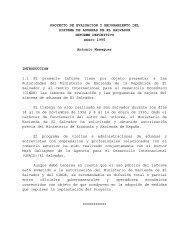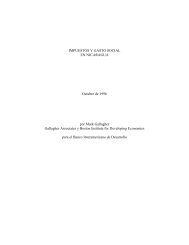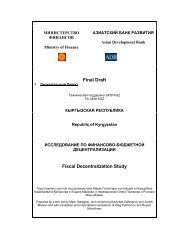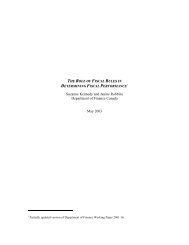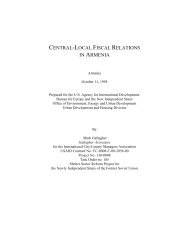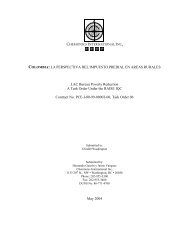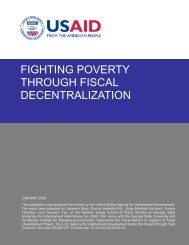Effectiveness and Economic Impact of Tax Incentives in the SADC ...
Effectiveness and Economic Impact of Tax Incentives in the SADC ...
Effectiveness and Economic Impact of Tax Incentives in the SADC ...
You also want an ePaper? Increase the reach of your titles
YUMPU automatically turns print PDFs into web optimized ePapers that Google loves.
3-10 EFFECTIVENESS AND IMPACT OF TAX INCENTIVES IN THE <strong>SADC</strong> REGION<br />
<strong>in</strong>herently complicates <strong>the</strong> system. Second, prevent<strong>in</strong>g <strong>and</strong> controll<strong>in</strong>g <strong>the</strong> abuse <strong>of</strong> loopholes<br />
absorbs highly skilled adm<strong>in</strong>istrative resources. Third, senior tax adm<strong>in</strong>istrators should be<br />
<strong>and</strong> generally do participate <strong>in</strong> design<strong>in</strong>g tax <strong>in</strong>centives, screen<strong>in</strong>g applicants, <strong>and</strong> monitor<strong>in</strong>g<br />
performance. Highly tra<strong>in</strong>ed <strong>of</strong>ficers are thus diverted from rais<strong>in</strong>g revenue to manag<strong>in</strong>g<br />
programs designed for o<strong>the</strong>r social <strong>and</strong> economic purposes. As emphasized by Zee, et al.<br />
(2002, 1501): “The more scarce resources are devoted to adm<strong>in</strong>ister<strong>in</strong>g tax <strong>in</strong>centives, <strong>the</strong> more<br />
o<strong>the</strong>r important adm<strong>in</strong>istrative tasks would be impaired—thus jeopardiz<strong>in</strong>g tax collection as<br />
a whole.”<br />
4. <strong>Economic</strong> Cost <strong>of</strong> Fiscal Adjustment. The previous subsections show that <strong>in</strong>vestment tax<br />
<strong>in</strong>centives can cause revenue losses through diverse channels, most <strong>of</strong> which are <strong>in</strong>direct,<br />
obscure, <strong>and</strong> difficult to measure. To <strong>the</strong> extent <strong>of</strong> <strong>the</strong>se revenue losses, o<strong>the</strong>r fiscal<br />
adjustments are needed to cover <strong>the</strong> concomitant budget gap. The adjustments take three<br />
forms:<br />
•<br />
•<br />
•<br />
Curtail<strong>in</strong>g government expenditure. The government can curtail <strong>the</strong> growth <strong>of</strong> spend<strong>in</strong>g or<br />
reduce <strong>the</strong> provision <strong>of</strong> public goods <strong>and</strong> services. In this case <strong>the</strong> impact takes <strong>the</strong> form <strong>of</strong><br />
less fund<strong>in</strong>g for education, health, roads, water systems, rural development, <strong>the</strong> legal<br />
system, social safety nets, public adm<strong>in</strong>istration, <strong>and</strong> so on. If <strong>the</strong> spend<strong>in</strong>g cuts impair<br />
progress <strong>in</strong> fix<strong>in</strong>g o<strong>the</strong>r serious impediments to <strong>in</strong>vestment, <strong>the</strong>n <strong>the</strong> overall effect <strong>of</strong> <strong>the</strong> tax<br />
<strong>in</strong>centives may be <strong>the</strong> opposite <strong>of</strong> those <strong>in</strong>tended.<br />
Increas<strong>in</strong>g <strong>the</strong> tax burden on o<strong>the</strong>r activities <strong>and</strong> persons. The revenue loss can be f<strong>in</strong>anced with<br />
higher tax collections on o<strong>the</strong>r fronts, through <strong>in</strong>creas<strong>in</strong>g tax rates, broaden<strong>in</strong>g <strong>the</strong> tax base,<br />
or improv<strong>in</strong>g tax adm<strong>in</strong>istration. If <strong>in</strong>vestment <strong>in</strong>centives are f<strong>in</strong>anced this way, <strong>the</strong>n <strong>the</strong><br />
economic ga<strong>in</strong>s <strong>in</strong> tax-favored sectors come at <strong>the</strong> expense <strong>of</strong> a greater tax burden on o<strong>the</strong>rs,<br />
which may impair growth <strong>in</strong> o<strong>the</strong>r areas <strong>of</strong> <strong>the</strong> economy.<br />
Resort<strong>in</strong>g to o<strong>the</strong>r sources <strong>of</strong> f<strong>in</strong>anc<strong>in</strong>g. Instead <strong>of</strong> tak<strong>in</strong>g politically pa<strong>in</strong>ful steps to close <strong>the</strong><br />
budget gap, <strong>the</strong> government can seek <strong>in</strong>stead to f<strong>in</strong>ance <strong>the</strong> gap. Each source <strong>of</strong> f<strong>in</strong>anc<strong>in</strong>g,<br />
however, imposes a cost on <strong>the</strong> economy. Compensat<strong>in</strong>g for lost revenue by borrow<strong>in</strong>g<br />
from <strong>the</strong> central bank amounts to “pr<strong>in</strong>t<strong>in</strong>g money,” which contributes to <strong>in</strong>flationary<br />
pressure <strong>and</strong> economic <strong>in</strong>stability. Issu<strong>in</strong>g additional domestic debt tends to <strong>in</strong>crease real<br />
<strong>in</strong>terest rates <strong>and</strong> divert f<strong>in</strong>ancial resources from <strong>the</strong> private sector, thus impair<strong>in</strong>g<br />
<strong>in</strong>vestment. External borrow<strong>in</strong>g contributes to <strong>the</strong> build-up <strong>of</strong> foreign debt, with well<br />
known disadvantages. F<strong>in</strong>ally, foreign aid grants come with conditionality constra<strong>in</strong>ts <strong>and</strong><br />
high adm<strong>in</strong>istrative costs.<br />
Put simply, foregone revenue has an economic opportunity cost. The cost may be easy to bear<br />
if <strong>the</strong> revenue loss is small, or if <strong>the</strong> country has a strong fiscal system <strong>and</strong> ample f<strong>in</strong>ancial<br />
resources. But <strong>the</strong> cost can be exceed<strong>in</strong>gly high if <strong>the</strong> revenue loss is large, or if <strong>the</strong> country<br />
has a weak fiscal position <strong>and</strong> very scarce resources. Under such circumstances <strong>the</strong> revenue<br />
risk from <strong>in</strong>troduc<strong>in</strong>g tax <strong>in</strong>centives should be a paramount concern <strong>in</strong> <strong>the</strong> policy<br />
deliberations.



